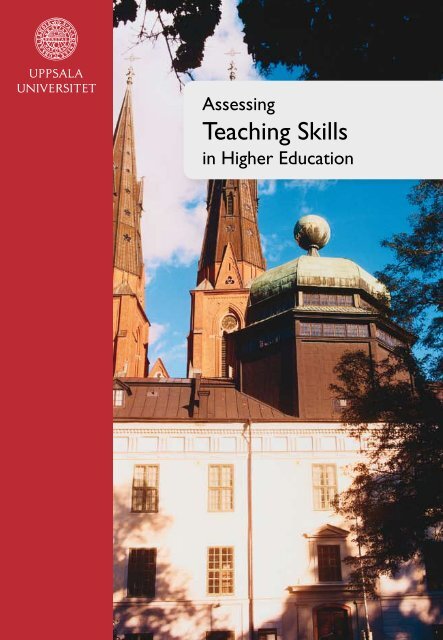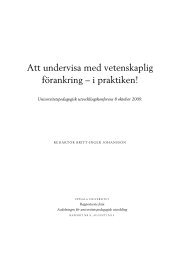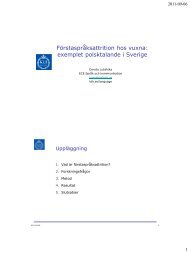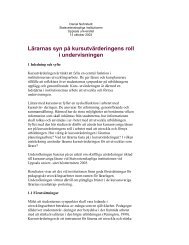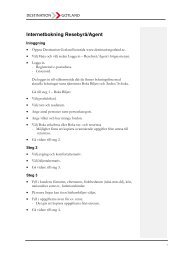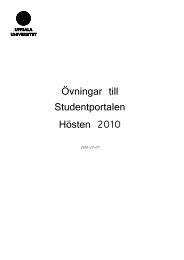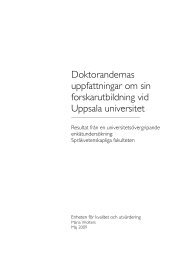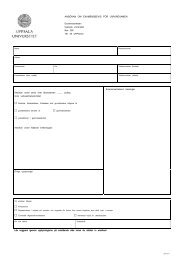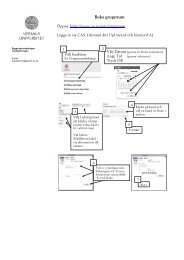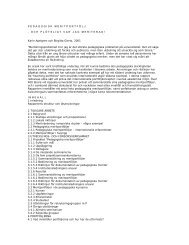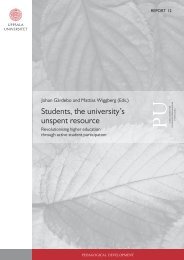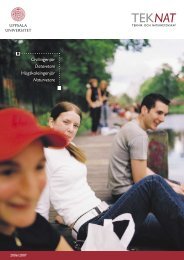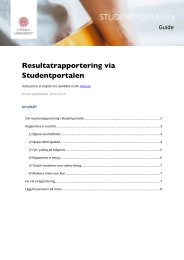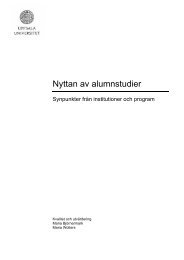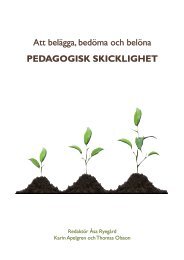Assessing Teaching Skills
Assessing Teaching Skills
Assessing Teaching Skills
Create successful ePaper yourself
Turn your PDF publications into a flip-book with our unique Google optimized e-Paper software.
<strong>Assessing</strong><br />
<strong>Teaching</strong> <strong>Skills</strong><br />
in Higher Education
Regulations<br />
How the demand for demonstrated teaching skills should be handled<br />
when appointing or promoting teachers in higher education is regulated in<br />
• Higher Education Act (HEA)<br />
• Higher Education Ordinance (HEO) and<br />
• Local rules and regulations at individual higher education institutions.<br />
Law and ordinance always apply; they define the framework for what<br />
can be prescribed in local regulations. Within this framework the<br />
guidelines at different institutions may vary. Therefore, be sure always<br />
to check what regulations in addition to law and ordinance apply in<br />
individual cases.<br />
The same rules apply to promotion and appointment.<br />
A twofold qualification requirement<br />
Like academic skills demonstrated teaching skills are a qualification<br />
requirement for senior lecturer and professor. For qualification as senior<br />
lecturer there is an additional qualification requirement of teacher training<br />
for teaching in higher education.<br />
The qualification requirements must be met for academic and teaching<br />
skills separately. Insufficient skills in one area cannot be compensated by<br />
excellent skills in the other.<br />
Some facts<br />
Qualification Requirements<br />
Only a person who has demonstrated academic and teaching skills may be<br />
appointed professor.<br />
(3 chapter HEA)<br />
Qualified for appointment as senior lecturer is a person who<br />
• Holds a doctorate …<br />
• Has taken part in teacher training …<br />
• Has demonstrated teaching skills.<br />
(4 chapter HEO)<br />
The qualification requirements must be fulfilled for academic and teaching skills<br />
separately. Excellent skills in one qualification area cannot compensate for insufficient<br />
skills in the other.<br />
(Uppsala university, Guidelines for the appointment of teachers)<br />
2
Who can give expert judgement on teaching skills<br />
Academic and teaching skills shall be assessed with the same amount<br />
of care. This means that both assessments must be made with equal<br />
expertise. It might be appropriate to engage a special referee for the<br />
assessment of teaching skills, in addition to the experts engaged for the<br />
assessment of academic skills. If so, this should be someone well acquainted<br />
with teaching in higher education<br />
Some facts<br />
Assessment<br />
As much attention shall be given to the assessment of teaching skills as to the<br />
assessment of academic skills.<br />
(4 chapter HEO)<br />
Separate referees for the assessment of teaching skills might be called in. This<br />
possibility should always be considered in order to make sure that applicants<br />
receive such expert judgement of their teaching skills as they have a right to<br />
expect and as is required according to HEA and HEO.<br />
(Uppsala University, Guidelines for the appointment of teachers)<br />
Focus on quality<br />
When assessing teaching skills focus should be on the quality of the<br />
teacher’s pedagogical work. If the material presented for assessment<br />
does not allow judgement of the quality, the teacher shall be given the<br />
opportunity to add to the application.<br />
3
What Is Meant by <strong>Teaching</strong> <strong>Skills</strong><br />
The aim of all teaching activity is to facilitate and support student learning.<br />
Doing this in the best possible way is to show teaching skill.<br />
<strong>Teaching</strong> qualifications and teaching skills<br />
Support for student learning can take many different forms. Some<br />
support activities can be directly perceived by the students. Other<br />
activities are less apparent, but still important since they help create<br />
good working conditions for teachers and students and thereby have an<br />
influence on student learning.<br />
<strong>Teaching</strong> (including supervision and examination), the preparation of<br />
study guides and learning material, the development of courses and new<br />
methods, efficient administration and good pedagogical leadership are<br />
examples of different types of pedagogical work. Of importance is also<br />
what the teacher has done to develop and maintain his or her pedagogical<br />
competence.<br />
The different pedagogical activities a teacher has performed are all part<br />
of his or her teaching qualifications. These teaching qualifications are<br />
what the teacher presents as a basis for an assessment of teaching skills<br />
<strong>Teaching</strong> skills ae related to the way in which the teacher has performed<br />
the activities. The assessment of teaching skills should focus on how the<br />
teacher works, not what the teacher has done.<br />
Some facts<br />
<strong>Teaching</strong> Qualifications and <strong>Teaching</strong> <strong>Skills</strong><br />
All work activities related to teaching and learning, including the teacher training<br />
courses the teacher has taken, together form his or her teaching qualifications.<br />
<strong>Teaching</strong> skills are related to the way in which the teacher has carried out the<br />
activities and what results have been achieved.<br />
4
It is essential to make a distinction between teaching activities and teaching<br />
skills. Comprehensive teaching activities are not by themselves proof of demonstrated<br />
teaching skills. When judging teaching skills focus should be on to<br />
what extent the teacher has carried out the activities in such a way as to help<br />
improve student learning.<br />
Applications that display teaching skills<br />
Qualifications should be presented in such a way as to make possible an<br />
assessment of the quality of the performed work. It is up to the applicant<br />
to present his or her qualifications in such a way that an objective<br />
assessment of the quality can be made. A list of what the teacher has<br />
done – a traditional curriculum vitae – is not sufficient basis for an assessment<br />
of teaching skills.<br />
Some facts<br />
<strong>Teaching</strong> Portfolios<br />
<strong>Teaching</strong> portfolios<br />
offer a model for presenting pedagogical experience in such a way that the<br />
teaching skills can be assessed. The basic idea is that the teaching portfolio<br />
should demonstrate not only what the teacher has done, but also how the<br />
teacher works, why he or she works in that way and what results have followed.<br />
See reference list and reading tips for further information on teaching portfolios!<br />
5
<strong>Teaching</strong> skills need to be defined<br />
Every assessment requires both general knowledge about the nature<br />
of the phenomenon to be assessed and specific knowledge about what<br />
aspects are important for the assessment. In this respect there is no difference<br />
between the assessment of academic skills and teaching skills.<br />
However, the tradition and consensus that exist in connection with<br />
judging academic skills do not exist in relation to teaching skills.<br />
Some facts<br />
Assessment of Qualifications<br />
In principle academic and teaching skills shall be assessed in the same way. In<br />
both cases a documentation of the qualifications is required and the assessment<br />
shall be based on clearly defined criteria.<br />
SOU 1992:1, Appendix 2<br />
It has been suggested that teaching skills cannot be assessed, at least not<br />
in a satisfactory way. That is of course not true. But in order to make<br />
valid and reliable assessments the scope and meaning of teaching skills<br />
need to be clearly formulated.<br />
A matter of legal rights<br />
Every person who is assessed has a right to know on what grounds the<br />
assessment has been made. This is an additional reason why it is important<br />
to clarify what is meant by teaching skills. A clear formulation<br />
of the basis for an assessment is also helpful when the judgements of<br />
different assessors are compared.<br />
Clear criteria<br />
What criteria of teaching skills are relevant depends on the way teaching<br />
skills are defined.<br />
Different assessors might define teaching skills in different ways. In individual<br />
cases certain aspects might be more relevant than others. This will<br />
of course influence the choice of criteria.<br />
The important thing is always to specify clearly what criteria have been<br />
used when making an assessment.<br />
6
Criteria related to everyday work<br />
Criteria of teaching skills are typically formulated on a fairly general and<br />
abstract level. This naturally follows when the aim is a limited number<br />
of criteria that can be widely used. But it entails problems when trying<br />
to apply them. Broad and general criteria can normally not be used as a<br />
basis for assessment unless they are first specified and connected to current<br />
circumstances.<br />
Criteria can be specified in different ways. One possibility is to formulate<br />
indicators – examples of procedures or results that show that certain<br />
criteria are fulfilled. Another possibility is to formulate questions exemplifying<br />
ways in which the meaning of the criteria can be clarified.<br />
The meaning of teaching skills can be described by formulating<br />
• A definition<br />
• Criteria that follow from that definition<br />
• Examples of what it means to fulfil the different criteria.<br />
7
On a Scientific Basis<br />
Higher education should be based on research findings. This holds for<br />
teaching and other support for student learning as well as for the subject<br />
content of the education.<br />
The scientific approach characteristic of research should be applied also<br />
in relation to teaching. This means that decisions on e.g. teaching<br />
methods or forms of examination and evaluation should be based on<br />
what research has shown will best support student learning.<br />
Demonstrating teaching skills involves among other things familiarising<br />
oneself with the research-based knowledge that exists concerning the<br />
best way to support student learning.<br />
The assessment of teaching skills should also be based on research<br />
findings. The validity of the definition of teaching skills used, as well as<br />
of the criteria applied in an assessment, should be supported by research<br />
findings.<br />
Making expert assessment of teaching skills means considering both<br />
tested experience and research-based knowledge of student learning.<br />
There is research concerning …<br />
• the characteristics of good teachers<br />
• how to provide the best support for student learning<br />
• pros and cons associated with different teaching methods<br />
• how forms of examination influence how students learn and what they learn<br />
…and many other educational issues.<br />
See reference list for reading tips!<br />
8
A research-based definition of<br />
teaching skills<br />
International research studies emphasise three aspects when defining<br />
teaching skills. They focus on<br />
• What teachers do (different kinds of abilities)<br />
• Different kinds of knowledge that teachers need in order to be able to<br />
act in the best possible way<br />
• Attitudes and underpinning values that teachers embrace and apply.<br />
What teachers do and the consequences of that is the immediately visible part<br />
of teaching skills.<br />
Knowledge and attitudes are underlying factors that shape a teacher’s actions.<br />
To uphold teaching skills there is a need for continuous updating of knowledge<br />
and development of competence.<br />
Cooperation with others, within and outside higher education, is one way to<br />
demonstrate teaching skill and can also help develop it further.<br />
Good pedagogic leadership and efficient administration are also important to<br />
create favourable conditions for student learning.<br />
An assessment of teaching skills should take into account all these<br />
aspects of a teacher’s pedagogical competence.<br />
9
Criteria<br />
The eleven criteria presented here are aimed at assessment of teaching<br />
skills in connection with applications for appointment or promotion<br />
at Uppsala University (vice-chancellor decision 2003-06-23). They are<br />
based on research in higher education and have been formulated in consultation<br />
with teachers from different academic disciplines.<br />
Attitudes<br />
Two aspects of teachers´ attitudes are relevant:<br />
• The way in which the teacher relates to students and designs his or her<br />
teaching. To put into practice the kind of attitude that secures the best support<br />
for student learning can be regarded as the cornerstone of teaching<br />
skills.<br />
• A scientific approach to teaching. This involves applying the same kind of<br />
thinking in relation to teaching as is done within research.<br />
1. An attitude that furthers student learning<br />
Evidence of this could be that the teacher<br />
• applies a well motivated teaching philosophy<br />
• has a clear conception of the roles and responsibilities of student and<br />
teacher<br />
• informs students about the reasons for his or her decisions on teaching<br />
• strives for good contact with all students<br />
• creates a good teaching climate<br />
• informs himself/herself about students´ previous knowledge and<br />
qualifications<br />
• has students as the starting point when planning teaching<br />
• helps students develop good study habits<br />
• listens to students<br />
• stimulates students to be active learners.<br />
10
Important parts of a teaching philosophy are<br />
• The conception of knowledge<br />
What do I see as important knowledge in the courses I teach How do<br />
I want the students to perceive knowledge in my subject area How do I<br />
work to achieve this<br />
• The perception of learning<br />
What supports or hinders student learning What impact does that have on<br />
my teaching What do I know about different learning styles and how do I<br />
apply that knowledge in my teaching<br />
• The relationship between teacher and student<br />
Who is responsible for what What can students expect from the teacher<br />
and vice versa How do I interact with my students to form a relation that<br />
supports student learning<br />
• The goals of teaching<br />
What goals do I have What is important to me How do I work to achieve that<br />
2. A scientific approach<br />
Could be demonstrated by<br />
• Planning teaching in accordance with what research has shown gives the<br />
best support to student learning<br />
• Linking teaching to present research findings within the subject area in<br />
question<br />
• Applying a reflective and critical attitude<br />
• Helping students develop a reflective attitude and critical thinking.<br />
11
Knowledge<br />
As a basis for demonstrated teaching skills a teacher needs<br />
knowledge within four areas:<br />
• About the subject area (content knowledge)<br />
• About student learning (pedagogical knowledge)<br />
• About teaching (instructional knowledge)<br />
• About educational goals and organisation (curricular knowledge).<br />
3. Broad and appropriate subject knowledge<br />
This means that the teacher<br />
• Is competent within the subject area<br />
• Is continuously updating his or her knowledge<br />
• Seeks information about subject related research, e.g. via journals or by<br />
attending conferences.<br />
4. Knowledge about how students learn<br />
Evidence of this could be that the teacher<br />
• Has good general knowledge about learning<br />
• Helps students develop critical thinking<br />
• Is familiar with and shows consideration for different learning styles<br />
• Is informed about didactic knowledge about student learning in the<br />
subject area he or she teaches<br />
• Is continuously developing his or her knowledge by attending courses<br />
on teaching or pedagogical conferences.<br />
12
5. Knowledge about teaching<br />
Evidence might be that the teacher<br />
• Is familiar with requirements and consequences connected with<br />
different teaching methods<br />
• Has good knowledge about the different parts of the teaching process<br />
• Has used different teaching methods<br />
• Is familiar with a variety of examination and assessment methods<br />
• Is continuously developing his or her knowledge by attending courses<br />
on teaching or pedagogical conferences.<br />
6. Knowledge about educational goals and organisation<br />
Implies that the teacher<br />
• Is aware of the general goals and regulations of higher education<br />
• Conducts his or her teaching within the stipulated framework<br />
• Is well acquainted with future working life demands, e.g. in vocational<br />
educations<br />
• Has good curricular knowledge<br />
• Makes sure that the course goals are attained<br />
• Varies teaching methods and content according to available resources<br />
and the situation at hand<br />
• Clarifies goals and framework to students<br />
13
Practice<br />
Demonstrating teaching skills means putting the acquired knowledge of different<br />
kinds into practice . Using a holistic approach and adapting one’s teaching to the<br />
varying demands of different student groups are important aspects of this.<br />
Demonstrating teaching skills also involves regularity – at all times striving to do<br />
one’s best. To give a splendid performance once, e.g. when giving a trial lecture,<br />
does not call for the kind of skill that is needed to continuously provide the<br />
best possible support for student learning.<br />
7. A holistic view<br />
Could mean that the teacher<br />
• Informs himself/herself about other parts of the course or program<br />
• Explains to students how the course at hand relates to the education as<br />
a whole<br />
• Tries to attain coordination between different course sections and<br />
teachers<br />
• Adapts teaching to the existing framework<br />
8. Applied teaching skills<br />
Evidence could be that the teacher<br />
• Masters different teaching methods<br />
• Varies methods according to student needs<br />
• Structures the material in a way that is beneficial to student learning<br />
• Provides clear information in good time<br />
• Gives prompt feedback<br />
• Provides overviews of course and class contents<br />
• Uses a variety of examination methods<br />
• Develops study guides or writes teaching materials<br />
• Works well together with other teachers and personnel<br />
• Is an appreciated teacher.<br />
Good student grades may also be a result of good teaching!<br />
14
Improving one’s teaching<br />
<strong>Teaching</strong> excellence entails a desire for development and continuous updating<br />
of knowledge and skills. Learning from experience – good as well as bad – is a<br />
distinguishing trait. A reflective attitude towards ones own practice is of fundamental<br />
importance.<br />
9. Striving for continuous improvement<br />
Could mean that the teacher<br />
• Directs reflection and critical examination to his or her work<br />
• Puts course evaluations to meaningful use<br />
• Discusses his or her teaching with others<br />
• Develops courses and teaching<br />
• Engages in educational development<br />
• Takes teacher training courses<br />
• Writes about teaching in educational journals<br />
• Informs about teaching experiences at for example conferences.<br />
15
Leadership, administration and cooperation<br />
<strong>Teaching</strong> skills can also be demonstrated by creating good conditions for<br />
student learning in other ways than in direct connection with the planning,<br />
performing and evaluation of teaching. Leading and organising teaching activities<br />
is one example. Cooperation with others within or outside higher education<br />
is another.<br />
10. Excellent leadership and administration<br />
Can be shown by accepting leadership and carrying out the<br />
adherent duties in such a way that<br />
• General cooperation and participation is furthered<br />
• There is clear information and efficient communication<br />
• Pedagogical development and discussions about teaching are stimulated<br />
• He or she is an appreciated leader of pedagogical activities.<br />
11. Cooperation with others and contacts with the<br />
surrounding society<br />
Could mean that the teacher<br />
• Stays informed about changes in the school system and its<br />
consequences for higher education<br />
• Shares experiences and knowledge with colleagues<br />
• Finds out what future employers expect students to know<br />
• Participates in discussions on the purpose of higher education<br />
• Contributes to popular adult education and popular science activities.<br />
16
An alternative formulation<br />
Criteria of teaching skills can also be formulated as statements about what<br />
characterises teachers that demonstrate good teaching skills. The statements<br />
presented in this section are based on a compilation of research findings made<br />
by Paul Ramsden et al. in 1995. Each statement is followed by questions<br />
designed to help the assessor find useful applications.<br />
What are the characteristics of good teachers<br />
1. Good teachers see as their most important task to help<br />
students learn; they design their teaching to support student<br />
learning in the best possible way.<br />
• How does the teacher describe his or her teaching philosophy<br />
• How does the teacher obtain information about students, e.g. their<br />
previous knowledge and learning styles<br />
• What evidence is there that the teacher considers students´ needs<br />
when planning and conducting teaching<br />
• How does the teacher work to help all students develop<br />
• How does the teacher get information about how students perceive<br />
the teaching<br />
17
2. Good teachers display enthusiasm for their subject, and a<br />
desire to share it with their students.<br />
• How does the teacher transfer enthusiasm for the subject and an active<br />
interest in the studies to the students<br />
• What evidence is there of enthusiastic teaching<br />
• How do students rate the teacher’s enthusiasm, e.g. in courses that have<br />
been repeated many times<br />
3. Good teachers draw on their knowledge of their subject,<br />
their knowledge of their learners, and their general<br />
pedagogical knowledge to transform the concepts of the<br />
discipline into terms that are understandable to their students.<br />
• Does the teacher have broad and appropriate subject knowledge<br />
How does the teacher update his or her knowledge<br />
• Is there evidence that the teacher relates teaching to research in a way<br />
understandable to students<br />
• Are there examples of what the teacher has done to help students<br />
understand the meaning of basic concepts within the subject area<br />
• Is the teacher familiar with existing knowledge about teaching and<br />
learning How does the teacher develop his or her competence in<br />
these areas<br />
• How does the teacher secure information about how the subject content<br />
is perceived by the students<br />
18
4. Good teachers encourage learning for understanding and are<br />
concerned with developing their students´ critical-thinking skills,<br />
problem-solving skills, and problem-approach behaviours.<br />
• How does the teacher encourage a holistic approach and<br />
understanding<br />
• What does the teacher do to design teaching in such a way as to help<br />
students develop critical thinking<br />
• How does the teacher make problem-solving activities a natural part of<br />
the teaching<br />
• What does the teacher do to find out if the students have achieved<br />
understanding and developed critical thinking<br />
5. Good teachers show respect for their students; they are<br />
interested in both their professional and their personal<br />
growth, encourage their independence, and sustain high<br />
expectations of them.<br />
• What evidence is there that the teacher respects the students<br />
• How does the teacher work to help students become independent<br />
learners<br />
• What evidence is there that the teacher shows consideration for<br />
student views<br />
• How do students perceive the teacher´s attitude and support<br />
19
6. Good teachers set clear goals, use valid and appropriate<br />
assessment methods, and provide high quality feedback to<br />
their students.<br />
• What teaching goals has the teacher set<br />
• What has the teacher done to clarify his or her goals to the students<br />
• What evidence is there that the examination methods used are in<br />
accordance with the goals<br />
• When and how does the teacher give feedback to the students<br />
• How do students perceive the feedback given by the teacher<br />
7. Good teachers recognise the importance of context, and<br />
adapt their teaching accordingly. They know how to modify<br />
their teaching strategies according to the particular students,<br />
subject matter and learning environment.<br />
• What strategies does the teacher use to adapt subject content and<br />
teaching methods to the framework at hand<br />
• How does the teacher help students realise the importance of goals and<br />
framework<br />
• Are there examples showing that the teacher has modified teaching in a<br />
changing situation, to better support student learning<br />
• How does the teacher prepare to meet diverses student groups<br />
20
8. Good teachers show versatility and flexibility. They have<br />
broad competence both in the use of various teaching<br />
methods and teaching at different levels, and in the mastery<br />
of varying subject contents.<br />
• What experience does the teacher have of teaching at different levels and<br />
to diverse target groups<br />
• Is the teacher familiar with a variety of teaching methods and teaching<br />
strategies and how they function in different settings<br />
• What is the teacher’s attitude towards teaching outside his or her own<br />
speciality<br />
9. Good teachers are prepared to develop their teaching<br />
through cooperation with others, within the academic<br />
setting as well as in the surrounding society.<br />
• How does the teacher cooperate with others – colleagues, students and<br />
administrative personnel<br />
• As a course director, what strategy does the teacher use to involve<br />
everyone, and to make use of everybody’s competence<br />
• What kind of pedagogical leadership does the teacher demonstrate<br />
• What has the teacher done to create a dialogue with the surrounding<br />
society<br />
21
10. Good teachers are also good learners. For example, they<br />
learn through their own reading, by participating in a variety<br />
of professional development activities, by listening to their<br />
students, by sharing ideas with their colleagues, and by reflecting<br />
on classroom interaction and students´ achievements.<br />
• What has the teacher done to develop his or her teaching competence,<br />
especially during the last five years<br />
• Are there examples of how the teacher has applied newly acquired<br />
teaching competence<br />
• How does the teacher make use of cooperation with others to develop<br />
his or her competence<br />
• What evidence is there that the teacher reflects on teaching and<br />
student learning<br />
• In what way does the teacher communicate his or her own experiences<br />
to others<br />
22
Content and text: UPI, Uppsala University<br />
Cover picture: Alex Giacomini<br />
Illustrations: Anette Hedberg<br />
Graphic production: Ord & Vetande/Matador<br />
23
24<br />
This booklet is produced by<br />
and can be ordered from:<br />
Office for Development of<br />
<strong>Teaching</strong> and Interactive<br />
Learning, (UPI).<br />
Uppsala University<br />
Box 513<br />
751 20 Uppsala


